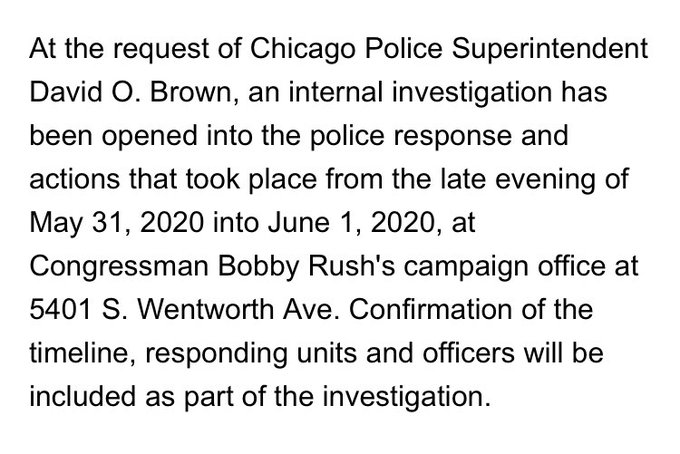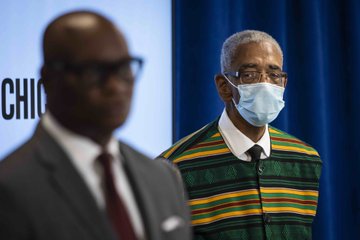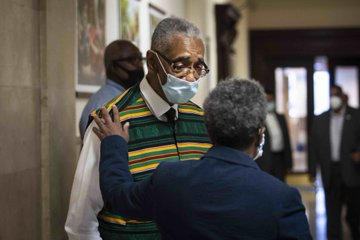https://phys.org/news/2020-06-liberaltarian.html
Added by CiC
Malhotra, the Edith M. Cornell Professor of Political Economy at Stanford Graduate School of Business, and Broockman, a former Stanford GSB professor who recently moved to the University of California, Berkeley, set out to quantify the political beliefs of one of the most powerful groups of businesspeople in the country: successful technology entrepreneurs.
What they discovered flies in the face of much received wisdom about the politics of America's technology elites.
When it comes to trade, taxation, and social issues, wealthy founders are more liberal than all but the most ardent progressives. But when it comes to regulation, they are more conservative than most Republicans, and in fact look more like libertarians. That unique combination of attitudes has powerful implications for how they might wield their growing political power to mold government policy.
Broockman and Malhotra discuss the origins of their research, how they conducted it, and what it tells us about the future of American politics.
What prompted this research?
Broockman: We're both really interested in using tools for understanding public opinion to explore how the economic elites who are gaining power in our society think about American politics.
Malhotra: We were speaking with a former TechCrunch journalist at the Battery, a club for Silicon Valley movers and shakers, and we realized that while there's been a lot of talk about the political beliefs of Silicon Valley elites—and by that we mean technology elites across the country—we have no hard data on what they actually believe when it comes to politics and policy.
Broockman: For example, some people say Silicon Valley is really libertarian, while others say technology entrepreneurs are just like loyal Democrats and are far to the left on social issues. We thought this is an increasingly important topic to understand in American politics.
How so?
Broockman: History is replete with examples of wealthy businesspeople, such as railroad executives and Wall Street bankers, who have changed the course of American politics through their tremendous political influence. And many of the most valuable firms in the U.S. are now technology firms. They have hundreds of thousands of employees, and their founders are amassing ever greater political influence. But while many researchers have thought about the way people on Wall Street view politics, there's been much less research concerning Silicon Valley. We wanted to think more clearly about what the Silicon Valley elite thinks and collect some data on it.
Malhotra: We're at a unique moment in American history. Forces like income inequality, globalization, and automation are going to dramatically change the way society and politics function. We'd love to go back in time and ask the railroad executives how they changed policymaking in the run-up to the Gilded Age, and that's exactly what we had the chance to do here: to ask technology elites how they actually think about politics, and to explore what that means for politics and policy at this inflection point in American history.
But why focus on technology entrepreneurs in particular? What makes them special beyond sheer economic clout?
Broockman: Our analysis wasn't motivated only by their economic power. Many other firms have that: They have lots of employees, they can donate a lot of money to political candidates and parties, they can decide where to put jobs. What makes Silicon Valley different from the railroads or Wall Street banks is that they also have a lot of eyeballs; Americans spend a lot of time looking at their smartphones every day. We saw the impact of this several years ago in the fight over the Stop Online Piracy Act and the PROTECT IP Act, which many tech firms opposed. Google put a little text on its homepage saying, "Please contact your senator," and Congress was inundated with calls and dropped the bills overnight.
Malhotra: They're also unique in that they have access to so much data. We're just beginning to understand the concept of data as capital, but the power to capture so much data about what everyone is doing—and to leverage that data for political influence—should not be underestimated.
Who exactly did you target, and how?
Malhotra: We merged data from Crunchbase, a professionally run database of individuals in the technology industry that contains information on the size of firms and how many rounds of funding they've received, with contact information for more than 4,200 founders and CEOs. Then we emailed them all a survey.
Broockman: More than 600 people who have founded successful companies responded. Most are millionaires, and their companies have raised more than $19.6 billion in venture capital.
Malhotra: At the same time, we surveyed more than 1,100 members of the elite donor class—the people who donate large amounts of money to political campaigns—and more than 1,600 ordinary citizens. So we had three very diverse groups of people answering the same exact questions about politics.
What kinds of questions did you ask?
Broockman: Traditionally, when people talk about politics they think in terms of left and right, or about economic issues and social issues. We wanted to break things down a little more, so we divided the issues we wanted to address into four domains.
The first, redistribution, involved questions like, "Should we tax wealthy people to fund universal social programs?"
The second, regulation, involved questions such as, "Should we require companies to treat gig workers as regular workers or not?" and "How much should the government be involved in structuring and regulating marketplaces?"
The third category involved social issues: abortion, gay marriage, the death penalty.
And the fourth concerned globalism, which involves issues like trade and immigration that have an impact on the welfare of people around the world.
What did you learn?
Malhotra: The big finding is that technology elites are basically liberal on every dimension you could imagine except regulation. They are more liberal than traditional Democrats on the redistributive dimension, the social dimension, and the globalist dimension. But they're as conservative as Republican donors on the regulatory dimension. And this is especially interesting because no other group of people we surveyed had this particular constellation of political beliefs.
Specifically, tech elites are not easily categorized as libertarians when it comes to economic issues, because they believe in the redistribution of income for things like health care, education, and poverty reduction. But at the same time, they believe that government should not be regulating business. So their overall approach is unique: Let the markets operate how they should and redistribute income after the fact. Some people have called this new type of political animal the "liberaltarian."
As founders and CEOs, couldn't their antipathy to government regulation simply be explained by self-interest?
Broockman: I'm sure that at least some of their political views have to do with self-interest. But we showed that their values and predispositions—in particular, a favorable predisposition toward markets and entrepreneurs, and a negative predisposition toward government control—are important too.
Malhotra: We ran an experiment where we divided people into two groups. We asked Group A if the price of an Uber car should go up when there's a lot of demand. This is a classic example of surge pricing or price discrimination, and most ordinary people in our survey, whether Democrat or Republican, were very divided on the issue—about half of people in both parties said that you should raise prices on Uber cars when there's a surge in demand. But basically 100 percent of technology elites said it's OK for Uber to raise prices during a surge, which is what you would expect people who firmly believe in free markets to say: Yes, the price should rise to meet the demand.
Now, you might say that's simply a matter of self-interest. They want Uber to raise its rates because they want the technology industry to do better. But remember that there were two groups. And Group B got a question that addressed the same core concept of price discrimination but had nothing to do the technology industry; namely, is it OK to raise the prices of flowers on Mother's Day or Valentine's Day, when demand is higher?
Again, ordinary people split roughly 50/50 on this question. But almost 100 percent of technology elites still thought that it was OK to surge price flowers on Valentine's Day or Mother's Day. This shows that there are some genuine values at work, and not just a desire to increase profit margins in the tech industry.
Broockman: In political disagreements, we often assume that our opponents are speaking in bad faith. But our research shows that while their views might be informed by self-interest, many technology entrepreneurs genuinely believe as a matter of principle that markets should be freer and that entrepreneurs and enterprises—whether they are florists or companies like Uber—should have a freer hand in labor markets.
That finding is supported by a survey we conducted of Stanford undergraduates. When we compared students majoring in the natural sciences to students majoring in computer science—many of whom we know will go on to found tech firms—we saw these same differences in values and predispositions. So it seems that these patterns are already present when people are still in their late teens and early 20s, before they've founded companies or thought about stock options.
So you've got this unique group of people who are super-liberal in most respects but super-conservative when it comes to regulation. They're also rapidly accumulating political power, and they tend to support the Democratic Party. What does all that mean for American politics?
Malhotra: Historical research has found that political parties usually change when important groups within those parties agree with them on most things but disagree with them on a few things—and then shape the parties in their direction. This pattern has emerged over and over again in American history. So our research suggests that as technology elites become more important to Democratic Party fundraising, they are going to double down and promote traditional Democratic interests when it comes to social policy, redistribution, foreign policy, and immigration, but move the party toward the right when it comes to regulation.
Broockman: We're already starting to see signs of tension within the Democratic Party overregulation of labor markets. Take Uber again: Should gig workers for Uber be treated like regular workers or as contractors? Labor unions, which have historically held considerable influence within the Democratic coalition, believe it's important that gig workers receive all of the protections of traditional employees. Whereas technology entrepreneurs say, "No, we shouldn't be regulating how these companies treat their workers; we should allow them freedom in the marketplace."
Such tensions within the Democratic Party are going to become increasingly common as the big tech-sector donors to Democratic campaigns start to say, "Actually, we disagree with the labor unions that are endorsing you. We think you should take a different position on this issue."
How might the growing political power of tech elites—and the differences between their political beliefs and those of ordinary citizens—affect society at large?
Malhotra: The gap between elites and masses is a major political concern. Since World War II, there's been an agreement of sorts that some power would shift to elites, who would then look out for everybody's interests. But increasingly we've seen populist movements arising in the United States and around the world as people have realized that wages have stagnated even as expenses have gone up, in real terms, on things like health insurance and college tuition, and that their children are going to have a worse of standard of living than their own. So there's a lot of discussion about how our democratic institutions can survive without cooperation between masses and elites.
But up until now, there really was no data on what elites actually believe. More work needs to be done so that we can understand the potential political fault lines both in the United States and abroad.
Broockman: We're trying to understand the areas of disagreement between the elites and the masses. What policies do elites in both parties agree upon that the general public might oppose?
That produces some counterintuitive but important findings. For example, the technology entrepreneurs we surveyed were among the strongest supporters of universal health care. Understanding that can prevent us from leaping to simple conclusions like, "When the wealthy get more power, there will be less redistribution." That might not be true if the wealthy people come out of the tech industry.
Recommend this post and follow TCW



















